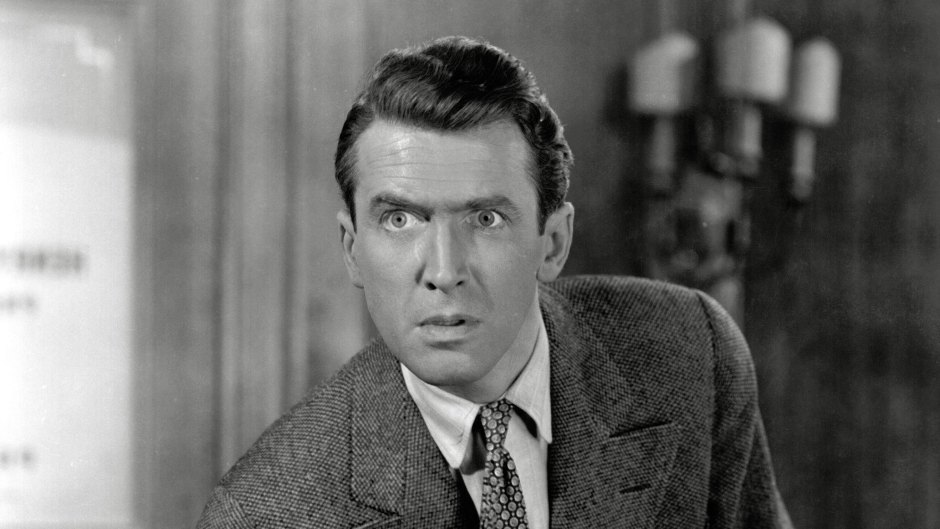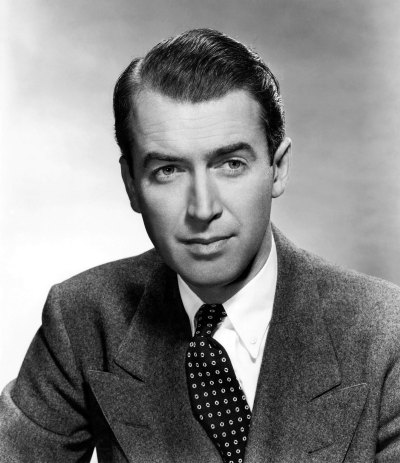
CPC/THA/Shutterstock
Jimmy Stewart Became a Hometown Hero After Hollywood Stardom: ‘He Liked to Meet People’
On his 75th birthday, a chorus of some 3,000 fans and friends sang “Happy Birthday” to Jimmy Stewart outside the courthouse in Indiana, Pennsylvania. The actor and WWII hero never lost his affection for the tiny town where he grew up, and Indiana has never stopped taking pride in its native son.
Today, the It’s a Wonderful Life star is immortalized by a museum dedicated to his life, movie career and war experiences. A 9-foot-tall statue of Jimmy stands across the street from where his father’s hardware store used to be and, fittingly, the local airport is named for the actor who distinguished himself with 20 combat missions over enemy lines
“This is where I sort of made up my mind about certain things,” Jimmy said on what would be his final visit home in 1983. “About hard work being worth it, about community spirit, about the importance of family, about the importance of God and the church.”
Located about 60 miles east of Pittsburgh, the Indiana of Jimmy’s boyhood was a place where everyone knew their neighbors. His father, Alexander, ran J.M. Stewart, a three-story hardware store founded by Jimmy’s grandfather in 1853. “It was the centerpiece of downtown and sold a little bit of everything,” Janie McKirgan, executive director of the Jimmy Stewart Museum, tells Closer. “People came in to buy everything from paint and building supplies to nails and coffee. It was also a place to gather and talk.”
Alexander and his wife, Elizabeth, raised Jimmy and his two younger sisters in a spacious Dutch Colonial home overlooking downtown at 104 N. 7th Street. “The whole family used to go to church every Sunday and then cross the street to his grandparents’ house for a meal afterward,” says McKirgan, who notes that Jimmy’s father sang in the church choir and his mother sometimes played the organ during services. “My parents did their best to teach me faith in God,” said Jimmy, “to shun pomposity and glibness, to be modest, because a decent, gentlemanly man is modest.”

Jimmy was a fine, but unexceptional student. He loved to doodle, and his active imagination led him to daydream in classes. Obsessed with aviation, he spent much of his childhood in his basement building model planes. At 16, he took a job at the Strand Theater, where he operated a hand-cranked film projector, but becoming an actor was not something he considered yet. The closest he came to performing was practicing the accordion.
In fact, it was not expected that Jimmy would ever leave his small town for long. Although he wanted to attend the United States Naval Academy at Annapolis, Maryland, his formidable father insisted he enroll in Princeton, his alma mater, with the goal of Jimmy eventually returning home and taking over the family business.
“I came from a very disciplined household,” said Jimmy. “My mother stopped Dad from being — well, over-boisterous. She was the only person he would listen to about anything. He would raise his voice about pretty nearly anything — but never to her.”
At Princeton, Jimmy studied architecture and electrical engineering, but he fell in love with acting. “Quite suddenly I didn’t care if I ever designed another building,” he admitted, “just so long as I could get somewhere on stage.”
In time, Jimmy would, of course, become one of Hollywood’s biggest and most beloved stars as well as a war hero, but he never turned his back on the town where he grew up or the people in it. “He had a best friend named Bill Moorhead. He kept in phone contact with him his whole life,” recalls McKirgan, who says the star also visited regularly. “He would fly into our small local airport to see his family. His parents lived here until they died.”
Sometimes Jimmy, who for many years allowed his father to display the Academy Award he won for The Philadelphia Story in J.M. Stewart’s front window, would take a walk around town. “He liked to meet people. He would sign autographs, talk, shake hands and pose for pictures,” says McKirgan.
Indiana, Pennsylvania, may not have been It’s a Wonderful Life’s Bedford Falls, but its timeless qualities helped hone the warmth, strong moral compass and humor that made Jimmy such a beloved American icon. “I want to be remembered as someone who believed in hard work and love of country,” he said, “love of family and love of community.”







































